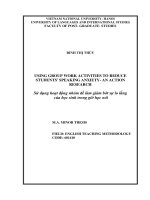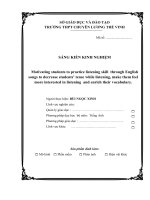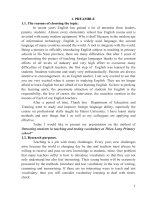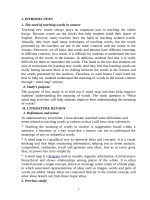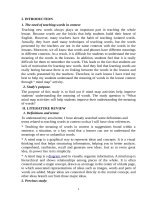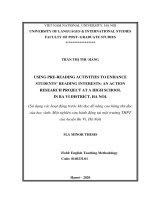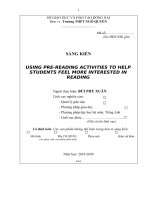skkn using post listening activities to help students feel more interested in listening
Bạn đang xem bản rút gọn của tài liệu. Xem và tải ngay bản đầy đủ của tài liệu tại đây (317.72 KB, 18 trang )
Ngo Quyen High School
Bui Phu Xuan
SỞ GIÁO DỤC VÀ ĐÀO TẠO ĐỒNG NAI
Đơn vị : Trường THPT NGÔ QUYỀN
___________________
Mã số: …………………..
SÁNG KIẾN KINH NGHIỆM
Using Post-listening Activities to Help
Students Feel More Interested in
Listening
Người thực hiện: BÙI PHÚ XUÂN
Lĩnh vực nghiên cứu:
Quản lý giáo dục
Phương pháp dạy học bộ môn: Tiếng Anh
Lĩnh vực khác:
Có đính kèm:
Mô hình
Đĩa CD (DVD)
Phim ảnh
Năm học: 2016-2017
***
Hiện vật khác
Ngo Quyen High School
Bui Phu Xuan
SƠ LƯỢC LÝ LỊCH KHOA HỌC
__________________________
I. THÔNG TIN CHUNG VỀ CÁ NHÂN
1. Họ và tên:
BÙI PHÚ XUÂN
2. Ngày tháng năm sinh : 02 / 09 / 1976
3. Nam/Nữ:
Nam
4. Địa chỉ: 103/71 Đường 30/4 Phường Trung Dũng Thành Phố Biên Hòa Tỉnh Đồng Nai
5. Điện thoại:
Cơ quan: 061.3829029
6. Fax:
Nhà riêng: 061.3819495
E-mail:
7. Chức vụ: Giáo viên
8. Nhiệm vụ được giao: Thư ký HĐ, giảng dạy bộ môn tiếng Anh
9. Đơn vị công tác: Trường THPT NGÔ QUYỀN
II. TRÌNH ĐỘ ĐÀO TẠO
- Học vị (hoặc trình độ chuyên môn, nghiệp vụ) cao nhất: Thạc Sỹ
- Năm nhận bằng: 2007
- Chuyên ngành đào tạo: Giảng Dạy Tiếng Anh
III.
KINH NGHIỆM KHOA HỌC:
- Lĩnh vực chuyên môn có kinh nghiệm: Giảng dạy bộ môn Tiếng Anh
- Số năm có kinh nghiệm: 18 năm
- Các sáng kiến kinh nghiệm đã có trong 5 năm gần đây:
+ Strategies for Developing Reading Skills Skimming and Scanning
+ Arousing Students’ Interest in Reading.
+ Using Interactive Tasks to Arouse High School Students’ Interest in
Learning Speaking.
+ Using Communicative Tasks or Activities to Promote High
School Students' Grammatical Competence.
+ Five-minute activities to activate students' schemata in reading
Ngo Quyen High School
Bui Phu Xuan
TOPIC: Using Post-listening Activities to Help
Students Feel More Interested in Listening
I. INTRODUCTION:
Nowadays English is considered as an international language. Many people in
Vietnam, as well as in other countries, need to use it as a communicative tool at
work, and in business environments. In all Vietnamese secondary schools, high
schools, colleges and universities, English is a compulsory subject. In
comparison with other English skills, listening skill is one of the most difficult
skills and teaching listening is a hard job for any ESL teachers. This is because
successful listening skills are acquired over time and with lots of practice. It's
frustrating for students because there are no rules as in grammar teaching.
I’ve been teaching English at Ngo Quyen High School for many years and from
my own experience of teaching I have found that a lot of students at my school
are afraid of listening periods. They seem very tense while listening in class and
almost lose interest in listening lessons because listening lessons which are
based on the school curriculum cannot satisfy students’ learning needs. They also
find no pleasure when completing the listening tasks. Therefore I strongly believe
that it is very essential to do something to help them get pleasure from listening
first and then improve their listening skill. For this reason I would like to apply
some post-listening activities in the listening lessons in order to help students feel
more confident in developing their listening skills.
Ngo Quyen High School
Bui Phu Xuan
II. RATIONALE OF THE STUDY
A. The importance of listening:
Listening takes as much as 50% of our everyday communication time. It is the
main channel of classroom instruction and the most used language skill at work
and at home. Many learners want to develop effective listening comprehension
because it is crucial to their success in studies, business, careers and personal
relationships.
Listening is assuming greater and greater importance in foreign language
classrooms. There are several reasons for this growth in popularity. By
emphasising the role of comprehensible input, second language acquisition
research has given a major boots to listening. As Rost (1994, pp. 141-142) points
out, listening is vital in the language classroom because it provides input for the
learner. Without understanding input as the right level, any learning simply
cannot begin. Listening is thus fundamental to speaking.
Adrian Doff also says that we cannot develop speaking skills unless we also
develop listening skills; to have a successful conversation, students must
understand what is said to them. Later, the ability to understand spoken English
may become very important (for listening to the radio, understanding foreign
visitors, studying, etc.)
Listening is a critical element in the competent language performance of adult
ESL learners, whether they are communicating at school, at work, or in the
community. Through the normal course of a day, listening is used nearly twice as
much as speaking and four to five times as much as reading and writing (Rivers,
1981). In a recent study of Fortune 500 Corporations, Wolvin and Coakley
(1991) found that listening was perceived to be crucial for communication at
work with regards to entry-level employment, job success, general career
Ngo Quyen High School
Bui Phu Xuan
competence, managerial competency, and effectiveness of relationships between
supervisors and subordinates.
B. The aim of the innovation:
Using Post-listening Activities to Help Students Feel More Interested in
Listening
C. The participants of the study:
Tenth grade to twelfth grade students in Ngo Quyen High School were chosen
to take part in the innovation.
D. Timing:
The activities finish in about 5 minutes of lesson time, but some can be even
shorter and others can be lengthened.
E. Content of the topic:
This contains some of the activities that teachers can use in class and I use the
Units in “English books 11 & 12” as examples in my activities.
III. PROCEDURE:
The Post-stage is like the follow-up stage. After students have practised the
target skill in the While-stage, they do an extension activity. This helps students
take the information or whatever they have produced in the While-stage, and do
something meaningful with it.
Post-listening is an important part in teaching listening skill. Post-listening
activities should be an extension of communicative outcomes and listening
materials. They have several aims which can be achieved concurrently or
separately. These aims include helping students to:
Ngo Quyen High School
Bui Phu Xuan
Practise other language skills (speaking, reading and writing) using the
same topic.
Consolidate what students had listened.
Examine and reinforce language points (e.g grammar, vocabulary, useful
expression)
At the end of the lesson it is advisable for the teachers to have some postlistening activities in order to determine how well the students have
understood what they listened to, however it is not always an easy job for the
teacher to design the tasks in an effective way.
Now let's look at some types of post-listening activities.
1. Activity 1: DISCUSSION
In an discussion students may aim to arrive at a conclusion, share ideas
about an event, or find solutions in their discussion groups. The purpose of the
discussion activity should be set by the teacher before the students are asked
to work in groups. For efficient group discussions the students should always
be encouraged to ask questions , paraphrase ideas, express their own opinions,
check for clarification, and so on.
Here are some examples :
Unit 1: HOME LIFE – English 12
After listening and finishing the tasks, students are asked to work in groups of
four and discuss some of the questions relating to the topic they’ve learnt.
a. How big is your family?
b. Do you live with your parents?
c. Do you live with your grandparents?
Ngo Quyen High School
Bui Phu Xuan
d. Are you the oldest or the youngest among your brothers and sisters? (if
you have any)
e. How do you get along with your brothers or sister? (if you have any)
f. How do you get along with your grandparents?
g. Who is the breadwinner in your family?
h. Who does the housework in your family?
i. Should children help with the housework?
j. How should we discipline children?
k. How important is family in your country?
Unit 6: FUTURE JOBS – English 12
I have my students work in pairs to discuss which of the following jobs they
would like or would not like to do and state the reasons for their choice. Then
I invite some students to report their ideas in front of the class and give
comments.
Pilot / waiter / taxi driver / singer / sir-hostess / teacher / farmer / tour
guide / journalist / policeman …
OR: I ask my students to work in groups of four and discuss some of the
questions relating to the topic they’ve learnt.
a. When you were a child, what was your dream job?
b. What is your dream job now?
c. What do you think is the worst job?
d. Do people usually get jobs related to their educational background? How
about you?
Ngo Quyen High School
Bui Phu Xuan
e. Does a university degree guarantee success in the future career?
f. What is the most important in your job?
g. Would you like to run your own business?
h. Is it better to work for someone else or be self-employed?
i. Should women and men be paid the same?
Unit 8: LIFE IN THE FUTURE - English 12
-
Teacher asks students to work in groups of four to discuss the advantages
and disadvantages of having a very long life.
-
Teacher goes around the class to give help if necessary
-
Teacher invites some groups’ representatives to report their ideas.
-
Teacher gives feedback and makes comments.
Suggested ideas:
Advantages:
- do many thing they want to do/ enjoy life more
- see their children and grandchildren grow up
- help their children and grandchildren
Disadvantages:
- too weak to do things and often ill
- feel lonely when their children are busy with work, and their friends
are dead
- …
Unit 11: BOOKS - English 12
Ngo Quyen High School
Bui Phu Xuan
I have my students work in groups of four to discuss the sentence: “A good
book is a good friend”, then I call on some groups’ representatives to report
their ideas.
Suggested ideas:
- Bring much help to our daily life (like a good friend)
- Tell us good things to do and bad things to avoid.
- Our sadness can be driven away by an hour reading; a book can
comfort us, support us to overcome the most difficult moment in life.
- It is the easiest friend of all; we can come to him any time we like
and talk to him as long as we want..
- When we are tired, we can leave him without excuse.
2. Activity 2: GAMES
Games are useful and effective tools for teachers to apply in language classes.
Using games for post-listening activities helps to make the lessons more
interesting, enjoyable, and effective. Lee (1995) lists a lot of advantages of games
when using in the classrooms such as they are “a welcome break”, “motivating
and challenging”, “provide language practice in the various skills”, etc.
The game “Slap the board”. This is a competitive game requiring students’
memory and quickness.
Unit 12: WATER SPORTS – English 12
Here is the rule:
- Teacher divides the students into two groups. Each group has 6
students.
- Teacher asks students to stand in two lines.
Ngo Quyen High School
Bui Phu Xuan
- Teacher writes a number of key words that they have just listened on
the board in English.
- Teacher reads Vietnamese meaning of one of those words loudly.
- First students of two lines have to find out the equivalent English
quickly and run to the board to slap on it
- The faster student will get 1 point for his/her group.
- Go on until the last students.
When using games to teach languages, teachers are able to bring relaxation
and fun to students. Students can learn and remember words more easily.
Moreover, games bring real world context into the classrooms. Therefore,
students are able to communicate effectively. Games should be an integral part of
the lesson, helping students practice language and enjoy themselves at the same
time. Of course, not all the lessons need games. They should be used
appropriately and flexibly in order that students are always eager for games.
3. Activity 3: GUESSING
Let’s take Unit 12: WATER SPORTS - English 12 as an example:
- Teacher divides the class into groups of four or five
- Choose one of the sports to talk about. Try to give as much
information on the game as possible.
- The other groups guess the name of the sport.
Suggested ideas:
+ It is the most popular sport in the world.
+ People often play it in a field.
+ The game is played by two teams of ten players and a goal keeper, using a
round ball that must not be handled during the game except by the goalkeeper.
Ngo Quyen High School
Bui Phu Xuan
The ball can be advanced by kicking up and down the pitch. Teams try to kick the
ball into the other team’s goal.
KEY: Football
4. Activity 4: ROLE–PLAY
Let’s take Unit 15: WOMEN IN SOCIETY - English 12 as an example:
- I have my students work in pairs.
- Student A plays the role of an interviewer and student B is a city
woman.
- Student A interview student B about her daily activities.
- After 5 minutes I invite some pairs of the students at random to
present their conversation in front of the class.
Suggested questions:
- What time/get up?
- What time/leave for work?
- What time/finish work?
- How much/earn?
- How many hours/do housework per week?
- What/do/weekend?
5. Activity 5: Find Someone Who ..
- We can use this kind of activity to give students a chance to interact
with each other at the end of the listening lesson.
Let’s take Unit 15: WOMEN IN SOCIETY – English 12 as an example.
Ngo Quyen High School
Bui Phu Xuan
Additional information
Questions
Classmate’s
(Who..?/What…?/Where…?/When
name
…?
Why…?/How…?
… always gets up before
six in the morning
… always has a big
breakfast
… exercises 2 or 3 times
each week
… watch TV more than 3
hours each day
… does homework after
class
… cooks dinner every
day
… goes to bed after
midnight
6. Activity 6: SUMMARY
In some units I ask my students to write a summary of what they remember
after the listening.
Let’s take Unit 3: WAYS OF SOCIALIZING - English 12 as an example:
Ngo Quyen High School
Bui Phu Xuan
- Teacher asks students to work in groups of four or five.
- Teacher asks students to summarize Ms Linda Cupple’s talk.
- Teacher gives some students as hints for student to summarize the
talk.
- Teacher invites some groups’ representatives to report to the class.
- Teacher gives feedback
+ Length of time
+ Time for calling
+ calling late at night
+ calling at weekend
- The students can begin their summary with:
In this talk Ms Linda gives us some pieces of advice on how to use the telephone
in the family. The first is to work out a reasonable length of time for a call ….
Let’s take Unit 5: HIGHER EDUCATION - English 12 as another example
I encourage the students to summarize what advice David gave to the
international students, based on his own experience as an international one. After
that I have them work in pairs to act out the roles of David and John.
At the end of the lesson I invite some pairs at random to the front of the class to
make their own conversation.
7. Activity 7: INTERVIEWING
Let’s take Unit 1: FRIENDSHIP - English 11 as an example
- Teacher asks students to work in pairs
- Students interview their partners about their best friends.
Ngo Quyen High School
Bui Phu Xuan
- Teacher moves around and gives help if necessary.
- Teacher invites some students at random to the front of the class to report
what they have known about their best friends.
- Teacher gives feedback and makes comments.
Suggested questions:
1. Can you describe one of your best friends?
2. How did you meet him/her?
3. What are some things you like about your best friend?
4. Do you think it is possible to have a best friend of the opposite sex
without becoming a girlfriend or boyfriend?
5. How many people do you consider your "best friends?"
6. What are some ways your best friend has influenced your life in a
positive way?
7. What qualities do you think are important in a friend?
8. How do you maintain a good friendship?
8. Activity 8: CROSSWORD PUZZLE
Sometimes I use crossword puzzle not only as a task to consolidate what
students have studied but also as a game to arouse students’ interest after a
long listening period.
Let’s take Unit 10: Endangered Species – English 12 as an example
I have my students work in pairs and use the clues to solve the puzzle and find
the key word:
1. Dugongs are sometimes called “______ cows”
Ngo Quyen High School
Bui Phu Xuan
2. A large black and white animal like a bear, that lives in China and is
very rare: __________
3. Endangered species should be ________ and saved.
4. The wild giant pandas are found only in Southwestern _________
5. _________ loss also causes pandas to be in danger
6. Why are dugongs in ________
7. We shouldn’t throw _______ into the seas
1
2
3
4
5
6
7
What is this word?
KEY:
3 P R O
5 H A
6 D A N
7 W
1
2
T
4
B
G
A
S
P
E
C
I
E
S
E
A
C
H
T
R
T
A
N
T
I
A
E
D A
E D
N A
T
Ngo Quyen High School
Bui Phu Xuan
IV. FINDINGS:
Questionnaire
The purpose of this survey is to find out about the students’ achievements in
listening classes, students’ feelings and attitudes to the listening.
Question: How far do you agree with the following statements?
1. strongly disagree
2. disagree
3. neutral
4. agree
5. strongly agree
Statements
1. My listening skills improve a lot
thanks to this listening class.
2. My listening class is very enjoyable
and interesting.
3. 3. I feel interested in completing the
tasks with my partners.
4. I feel very interested in the lesson
5. I like listening more if I have free
time after class.
1
2
3
9,2%
4
5
15,6% 75,2%
8,2%
7,5%
17,5
66,8%
5%
16%
7,8%
71,2%
2%
15%
10,8% 72,2%
8,7%
10%
20,5% 60,8%
Ngo Quyen High School
Bui Phu Xuan
V. Conclusion:
In conclusion, I strongly believe that all of the activities mentioned above for
Post-listening, such as discussion, games, guessing, role-play, find some who
…etc. do help students have deeper understanding of the listening lessons. By
using these above activities teachers can provide students with opportunities to
foster what they have learnt. These activities can also make a contribution to the
success of the listening lessons in which there is a requirement of student
individual roles or responsibilities in the language class.
In my final analysis, these Post-listening activities would give a good solution
to the problems in the process of teaching listening.
NGƯỜI THỰC HIỆN
Bùi Phú Xuân
***
Ngo Quyen High School
Bui Phu Xuan
REFERENCES
_________
Doff, A. 1988. Teach English: A Training Course for Teachers. Cambridge
University Press.
English Book 11. Education Publishing House
English Book 12. Education Publishing House
Lee, S.K. (1995). Creative games for the language class. “Forum”, 33(1), pg. 3
Rivers, W.M. (1981). Teaching foreign language skills (2nd ed.) Chicago:
University of Chicago Press.
Rost, M. 1994. Introducing Listening. London: Penguin.
Wolvin, W., & Coakley, C. (1991). A survey of the status of listening training in
some Fortune 500 Corporations. Communication Education, 40, 152-164.
________________________________
